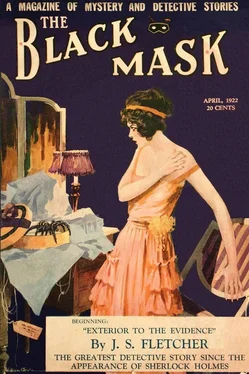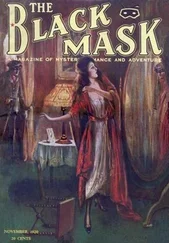J. Fletcher - The Black Mask Magazine (Vol. 5, No. 1 — April 1922)
Здесь есть возможность читать онлайн «J. Fletcher - The Black Mask Magazine (Vol. 5, No. 1 — April 1922)» весь текст электронной книги совершенно бесплатно (целиком полную версию без сокращений). В некоторых случаях можно слушать аудио, скачать через торрент в формате fb2 и присутствует краткое содержание. Город: New York, Год выпуска: 1922, Издательство: Pro-distributors Publishing Company, Жанр: Детектив, на английском языке. Описание произведения, (предисловие) а так же отзывы посетителей доступны на портале библиотеки ЛибКат.
- Название:The Black Mask Magazine (Vol. 5, No. 1 — April 1922)
- Автор:
- Издательство:Pro-distributors Publishing Company
- Жанр:
- Год:1922
- Город:New York
- ISBN:нет данных
- Рейтинг книги:3 / 5. Голосов: 1
-
Избранное:Добавить в избранное
- Отзывы:
-
Ваша оценка:
- 60
- 1
- 2
- 3
- 4
- 5
The Black Mask Magazine (Vol. 5, No. 1 — April 1922): краткое содержание, описание и аннотация
Предлагаем к чтению аннотацию, описание, краткое содержание или предисловие (зависит от того, что написал сам автор книги «The Black Mask Magazine (Vol. 5, No. 1 — April 1922)»). Если вы не нашли необходимую информацию о книге — напишите в комментариях, мы постараемся отыскать её.
The Black Mask Magazine (Vol. 5, No. 1 — April 1922) — читать онлайн бесплатно полную книгу (весь текст) целиком
Ниже представлен текст книги, разбитый по страницам. Система сохранения места последней прочитанной страницы, позволяет с удобством читать онлайн бесплатно книгу «The Black Mask Magazine (Vol. 5, No. 1 — April 1922)», без необходимости каждый раз заново искать на чём Вы остановились. Поставьте закладку, и сможете в любой момент перейти на страницу, на которой закончили чтение.
Интервал:
Закладка:
Once again Alan Nevins came toward her with outstretched arms. Again she drew away.
“Mr. Nevins, from now on, and until that gang has paid, you and I are strangers!”
III
The Step Lively Club was giving a dance at the Bird’s-Eye. Among those present in the crowded, smoke-smelly hall, was a slender, brown-eyed, dimpled girl. Her delicate hands, fine features and something in her manner indicated that she was of a decenter stock than the motley crowd surrounding her. But her cheeks were heavily rouged and her nose was a plaster-cast white; and she chewed gum. If you looked long enough, you began to feel that perhaps the refinement was a delusion on your part.
She sat at a table with six others, but she was not “in with them.” She “wall-flowered” through five dances before receiving so much as a smile from anyone in the hall. There was a reason; the girl was an outsider and the tribe that hangs around the Bird’s-Eye is suspicious of strangers.
Then the band played a waltz.
Some four tables to the left of the girl, two men and a woman were holding a whispered discussion. The woman was a tall, coarse-featured, capacious-chested blonde. One of the men was of the dark, slender, olive-skinned, small-moustached type you see in every movie; he’s the fellow who has his head broken by the hero in the last reel. The other man was a stunted, narrow-shouldered specimen, bleery of eye, pasty of hair and splotchy complected When the band started the waltz, the woman shrugged her shoulders and said, “Well — go on then and try her.”
So it came that the runt stood at the table of the brown-eyed girl, “Are you dancing, Miss?”
The girl gazed at him vacantly and switched her gum from her left cheek to her right. “Yeh, I dance.”
“My name’s Breen, Rudie Breen,” he volunteered, as he took her arm. “Y’ever been in this place before?”
“No. I’m in the town only a week. My name’s Rita Daly.” As they danced, she gave him the address of the house in which she roomed, on Fourth Street, near Avenue B. She also consented to let him join her at her table and buy her a drink.
“The waiter will put a kick in it, if I wink at him,” he suggested.
“All right. Ginger ale and wink,” she smiled.
But the drink was never served.
Above the din in the dance hall, there suddenly came the sounds of a scuffle in the barroom. Then harsh cries, oaths, the crash of broken furniture and the tinkle of splitting glass.
“Raid!” exclaimed Rudie.
The dance hall was on a level with the street. Some few feet from their table was a window. Rudie Breen seized the girl’s hand and pulled her toward it; but when he raised the lower frame, a uniformed officer poked his head through the frame-work and pointed a gun at them. They shrank back into the hall.
And now policemen rushed into the place through every opening; they came from the barroom, through the windows and through the door leading into the street, the door opening on the hallway. Every exit was covered. Mingled with the policemen was a goodly number of detectives.
An officer whose white cap and stripes showed his rank of inspector, and who seemed to be in charge, got up on a table, raised a hand, and when the place became hushed, he said: “No need for alarm, ladies and gents. We’ve found what we want in some barrels under a false floor in the cellar. Just pass out quietly in single file; all those not armed will be permitted to go.”
The procession started. The members and friends of the Step Lively Club were put to the indignity of having their pockets emptied and their handbags looked into before they were hustled through the door leading to the street.
Our brown-eyed girl with the chewing gum quid, took in the scene calmly. But of a sudden she felt that the hand still folding hers was trembling. Somewhat surprised, she turned to the young man and saw that his yellow complexion had turned a sickly pallor. His eyes shifted nervously about the room; he was evidently thoroughly frightened.
“What’s the matter?” asked the girl. “Got a gun on you?”
“N — no. But — this raid for booze is a blind — a cover. They’re diggin’ for snow — and if they find—”
Now if the truth be told, the girl had no idea of the meaning of Rudie’s words. She was sure of one thing, however; Rudie felt himself threatened by a terrible calamity. And reflecting upon this fact, it occurred to the girl that Rudie would be very grateful to the person who helped him get outside that hall. And if she had one good friend in that crowd — that would be a start.
“If — if someone could manage to put out the lights—” she suggested.
“Fat chance. The switchboard is in the barroom.”
“Locked?”
“No. They keep the board open for emergencies like this. The cops must have come in on them too quick for—”
“Which way do you work—?”
“You couldn’t go wrong. There’s only one lever — you pull it from left to right. But how you goin’ to get at—?”
“Oh!” The girl’s exclamation interrupted him. He noticed that she was staring hard and that a flush had come into her cheeks. He was too confused, however, to notice that the object of her stare was the detective who covered the door to the barroom.
“You pick out your exit,” she whispered to him. “I guess, maybe I can make it.”
With that she pushed aside several others and joined the line which was winding its way slowly out the side door. The process appeared too slow for her; she stepped out of line and came quickly forward. But she did not head for the door leading to the street; instead, she dodged past a policeman and ran toward the barroom door. She had almost reached it when the officer caught up with her and gripped her shoulder.
“No you don’t, Miss. You go out the same way as—”
For a moment, the girl looked up at the detective standing in the open barroom door. That gentleman suddenly startled, recovered quickly, and then favored the policeman with a frown.
“Why can’t I go out any way I please?” demanded the girl.
“Nix, Fritz, lay off!” muttered the detective.
The policeman grinned, released his hold on her. And the detective let her slip by him.
Thereupon things happened.
The searching process was going on in a slow, orderly way, when suddenly every light in the building went out.
In an instant everything was in a bedlam. Screams and terrible oaths, pleas, wailing cries of pain rang out in the darkness. The line broke; everyone fought viciously for freedom. Tables were overturned and windows smashed. The police dared not use their revolvers or clubs out of fear of injuring each other.
When the lights were switched on again, the hall was half empty. Most of those who remained were women; women with bleeding faces and torn hats and dresses.
Inspector Carrigan mopped his forehead. Then he looked with pity upon the cowering humanity before him.
“Send for an ambulance,” he instructed. “And go easy with them poor broken dolls. What we were after got away in the dark.”
IV
At five o’clock the following morning, the mother of Sergeant Alan Nevins was startled by the raucous ring of the door bell. Looking out of a front window, she saw a girl standing at her door. A moment later, Alan Nevins was being shaken out of a profound slumber. “Miss Cornell is at the door, Alan. Alan! Wake up!”
When Alan, dressed completely, up to and including the correct knot in his scarf, came down, the girl was waiting in his sitting-room.
“But my dear Marguerite,” he began.
“Miss Rita Daly, if you please,” she corrected. Then, “I’ve come to inquire whether your little raid of last evening was a success.”
Читать дальшеИнтервал:
Закладка:
Похожие книги на «The Black Mask Magazine (Vol. 5, No. 1 — April 1922)»
Представляем Вашему вниманию похожие книги на «The Black Mask Magazine (Vol. 5, No. 1 — April 1922)» списком для выбора. Мы отобрали схожую по названию и смыслу литературу в надежде предоставить читателям больше вариантов отыскать новые, интересные, ещё непрочитанные произведения.
Обсуждение, отзывы о книге «The Black Mask Magazine (Vol. 5, No. 1 — April 1922)» и просто собственные мнения читателей. Оставьте ваши комментарии, напишите, что Вы думаете о произведении, его смысле или главных героях. Укажите что конкретно понравилось, а что нет, и почему Вы так считаете.












